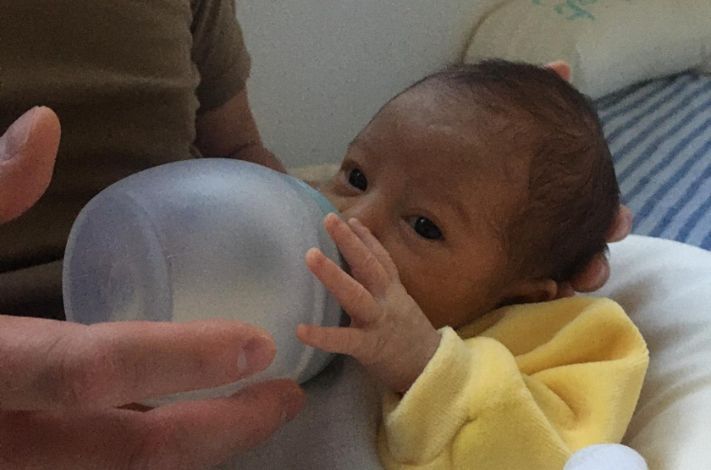The arrival of a first child is a memorable and emotionally-charged experience for many parents. This experience can be even more intense and worrying if the child is born prematurely.
Worry and feelings of helplessness can increase when faced with the additional challenges of caring for a premature baby, particularly in terms of feeding.
Feeding a premature baby is often a tricky business, but fortunately there are solutions to help parents through this ordeal.
Find out how to feed a premature baby with this comprehensive article!
CONTENTS :
- Why is a baby said to be premature?
- What causes a baby to be born prematurely?
- Feeding a premature baby who has the strength to suckle
- If your premature baby does not have the strength to breastfeed or bottle-feed
- To conclude
Why is a baby said to be premature?
A baby is considered premature if it is born before the usual term of pregnancy, generally between the beginning of the 38th week of amenorrhea and the end of the 41st week of amenorrhea.
Babies born before 28 weeks' gestation are considered very premature. They are cared for in specialized neonatal units because of their extreme fragility.
Premature babies can also be recognized by their low, or even very low, weight.
- Newborns weighing less than 1000 grams are considered to have an extremely low birth weight.
- Those whose weight is between 1000 and 1499 grams are classified as very low birth weight.
- Finally, babies weighing between 1500 and 2500 grams are categorized as low birthweight.
This weight-based classification provides the medical profession with indications of the health and needs of each premature infant.
What causes a baby to be born prematurely?
There are many reasons for premature delivery:
- twin pregnancies,
- premature placental abruption,
- fetal health problems requiring artificial induction of delivery by vaginal delivery or Caesarean section,
- a weakened cervix,
- premature rupture of the membranes,
- medical complications in the mother (gestational diabetes, preeclampsia, other...).
Feeding a premature baby who has the strength to suckle
Thanks to breast-feeding
Breastfeeding will provide all the nutrients a premature baby needs. It is therefore advisable toencourage your child if you wish to breastfeed. Because your baby's tiny stomach is unable to swallow large quantities of milk, and because of the effort required for each feed, you should remember to breastfeed regularly.
Your lactation will take care of itself as the days and weeks go by.
🍼 Related article: How to boost your lactation?
Expressing milk with a breast pump
If breastfeeding is not possible at every meal, you can express your breast milk and give it to your baby by bottle.
A regular expression maintains milk production and enables healthcare professionals to monitor the baby's nutritional intake, which is not possible with breastfeeding. This can be stressful for some parents, who are also unable to control the quantity milk intake.
You can use a breast pump to express your milk.
By giving special powdered milk for premature babies
If you don't want to breastfeed or pump, there are also special milks designed for premature babies, such as :
- Enfamil EnfaCare,
- Similac NeoSure,
- Gallia Bébé Expert Pre-Gallia,
- Guigoz UltimaPré (Guigoz pre-guigoz expert),
- ...
Before choosing the ideal infant formula, consult your paediatrician for advice.
Thanks to a bottle for premature babies
To offer your baby the expressed breast milk or powdered milk indicated by your paediatrician, you can use a special bottle designed for babies born before the end of the gestation cycle.
These bottles have adapted to their small mouths and their ability to suck.

If your premature baby does not have the strength to breastfeed or bottle-feed
Breast milk expression and administration with nasogastric tube or syringe
If your baby has difficulty suckling, expressed breast milk can be administered via a nasogastric tube. This tube is placed in the nose and descends into the stomach, enabling the baby to receive milk in a controlled manner.

Needle-free syringe nutrition
Another option is to administer expressed breast milk using a needle-free syringe. This can be done slowly, to allow the baby to get used to taking in food.
To conclude
Although the arrival of a premature baby can be a cause for concern, it's important to remember that, as parents, you're not alone. Thanks to medical advances and adapted solutions available on the market, the nutrition of a premature baby is now perfectly mastered!
In a nutshell :
- If your child is unable to feed from a bottle or breast, he or she will be cared for by a team in a neonatal unit.
- If he's strong enough, you can then breastfeed him and give him special milks.
Don't hesitate to equip yourself with a bottle specially designed for premature babies which will facilitate feeding at mealtimes, and give you peace of mind if breastfeeding isn't an option for you!



